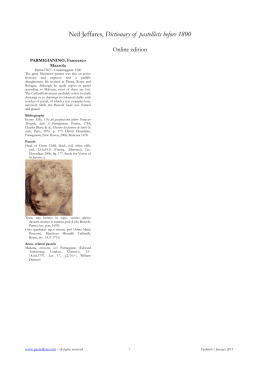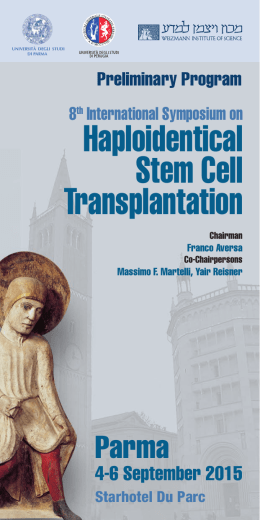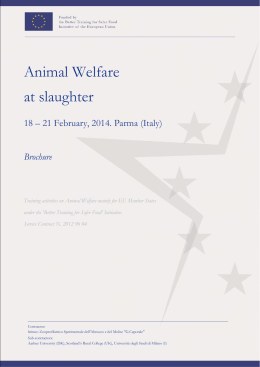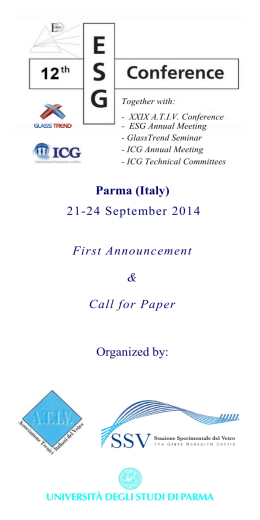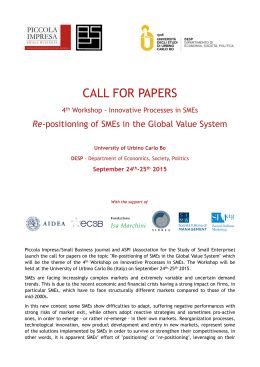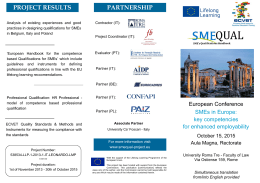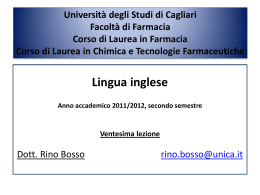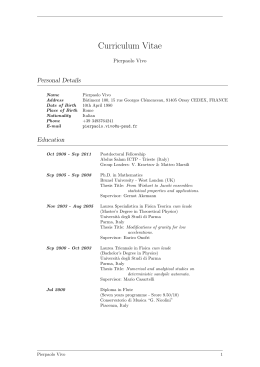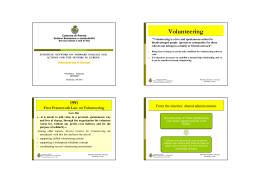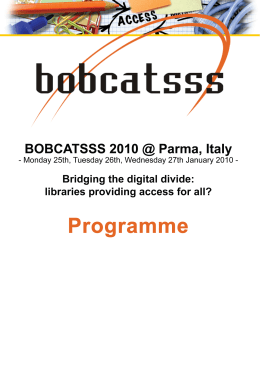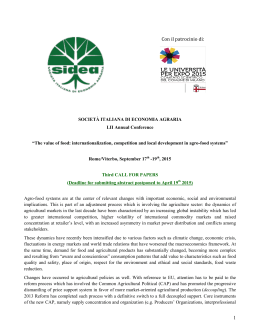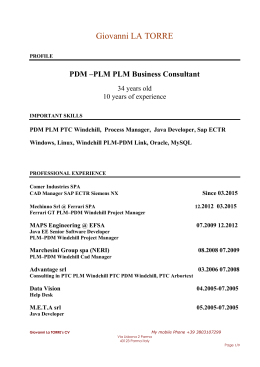CONVEGNO “ITALIAN FOOD FOR LIFE” FIERA DI PARMA, 8 MAGGIO 2008 FEDERALIMENTARE Servizi S.r.l. FOOD CHAIN MANAGEMENT Parma, 8 maggio 2008 PILLAR COORDINATOR: Giorgio Zasio – Saplo 1 FOOD CHAIN MANAGEMENT Communication, Training & Technology Transfer Pillar coordinator Giorgio Zasio – Saplo Food & Health Food Quality & Manufacturing Food Safety Working group Food & • Rita Acquistucci - INRAN Sustainable Consumer • Aldo Bertazzoli- UNIBO Food Production • Stefano Boccaletti- Università Cattolica • Laura Bortolotti CRA – Istituto Food Chain Management Nazionale di Apicoltura • Roberto Fanfani – UNIBO • Agostino Macrì – ISS • Marco Pagani – FEDERDISTRIBUZIONE • Paolo Polidori – UNICAM • Antonio Rizzi – Università di Parma • Anna Gloria Sabartini CRA –Istituto Nazionale di Apicoltura 2 • Angelo Visconti – ISPA –CNR Parma, 8 maggio 2008 FOOD CHAIN MANAGEMENT OBIETTIVI GENERALI Goal 1. Identification of possible scenarios. Goal 2. Stabilising markets and supporting food chain dynamics through the generation and preservation of trust. Goal 3. Improving the innovation potential of the food chain. Goal 4. Supporting competitiveness through integration. Goal 5. Participation of SMEs in complex food chain operations. 3 Parma, 8 maggio 2008 GOAL 1. IDENTIFICATION OF POSSIBLE STRUCTURAL SCENARIOS ON FIRM SIZE AND COMPETITIVENESS. Challenges/ Sfide 1. Global supply strategies and long term structural changes (positioning of SMEs in agro food chains, districts, developed and less favourite areas). 2. Responsiveness of food chains to policy changes: the role of Common Agricultural Policy, EU enlargement and WTO impact on typical food products. 4 Parma, 8 maggio 2008 GOAL 1. IDENTIFICATION OF POSSIBLE STRUCTURAL SCENARIOS ON FIRM SIZE AND COMPETITIVENESS. Deliverables/ Risultati attesi 1.1 Scenarios for Italian agro-food production and the future improvement of human capital. 1.2 Scenario on generation change at the farm and food enterprise levels, focusing on different types of existing enterprises 2.1. Scenarios on future reforms of the CAP and WTO negotiations, respect to international trade expansion for Italian typical food products. 2.2. Scenarios about agro-food SMEs different strategies of internationalization (delocalization, sub-contracting, partnerships, etc) and their structural changes(size, regional location, belonging to districts). 5 Parma, 8 maggio 2008 GOAL 2. Stabilising markets and supporting food chain dynamics through the generation and preservation of trust. Challenges/ Sfide 1. The complexity and heterogeneity of SMEs in the generation and preservation of trust in business-tobusiness relationships and innovative environment for dynamic chain and network developments. 2.1 Information flows and organizational solutions along supply chains, to ensure trust relationships with respect to food safety and quality of agro-food products. 2.2 Simulation of agent-based models of local interaction and emergent district structure. Parma, 8 maggio62008 GOAL 2. Stabilising markets and supporting food chain dynamics through the generation and preservation of trust. Deliverables/ Risultati attesi 1.1 Links between information flows and organizational solutions to ensure trust relationships with respect to food safety and quality of agro-food products. 2.1.1. Reference models to improve exchange of information and organizational integration on the food chain. 2.1.2 Analysis of best practices in FCM organization, with reference to producers (SMEs). 2.2.1. Specification of integration needs that allow SMEs to participate in emerging global food value chain. 2.2.2. Regional and sectorial differences on structural changes in FCM on typical, traditional and quality products. Contribution of network and models of integration and diffusion of innovation. Parma, 8 maggio72008 GOAL 3. IMPROVING THE INNOVATION POTENTIAL SMEs OF THE FOOD CHAIN AND TRADE Challenges/ Sfide 1. Improving the logistic and distribution system to lower transaction costs taking into account solutions which promote sustainable development. 2. Increasing competitiveness of SMEs through the development and diffusion of innovative standards. Parma, 8 maggio82008 GOAL 3. IMPROVING THE INNOVATION POTENTIAL SMEs OF THE FOOD CHAIN AND TRADE Deliverables/ Risultati attesi 1.1. Evaluation of alternative routes to improve the distribution of food products (North and South and towards other world trading areas). 1.2. Models and best practices in knowledge transfer and innovation diffusion with networks, clusters, consortia and institutions. 2.1. Analysis of innovation needs and knowledge transfer gaps in different food chain management activities and sectors. 2.2. Development of open IT services able to provide quality information to SMEs requests (label, printer, RFDI printer, SMS/MMS device, HTTP/HTTPS server). Parma, 8 maggio92008 GOAL 4. SUPPORTING SMEs COMPETITIVENESS THROUGH INTEGRATION Challenges/ Sfide 1. Collaboration/integration in food chains made of SMEs. 2. Sustainability of the activities of food chains. . 10 Parma, 8 maggio 2008 GOAL 4. SUPPORTING SMEs COMPETITIVENESS THROUGH INTEGRATION Deliverables/ Risultati attesi 1.1. Analysis of the causes of the limited levels of collaboration/integration in food chains made of SME’s. 1.2. Chain management approaches aimed at increasing the level of integration, based on the results already delivered by the international research. 2.1 Analysis of relationships between limited levels of integration and (environmental) sustainability of the activities of food chains. Study and proposal of potential solutions. 11 Parma, 8 maggio 2008 GOAL 5. PARTECIPATION OF SMEs IN COMPLEX FOOD CHAIN INFRASTRUCTURES. Challenges/ Sfide 1. Enhancement of traditional products able to promote natural and cultural landscapes of rural areas. 2. Role of collective brands to improve competitiveness of supply chains and networks. 12 Parma, 8 maggio 2008 GOAL 5. PARTECIPATION OF SMEs IN COMPLEX FOOD CHAIN INFRASTRUCTURES. Deliverables/ Risultati attesi 1.1. Productive capabilities related to the territorial situation and implementation of aggregation between producers. 1.2. Education and training on consumer’s preferences and market tendencies. 1.3. Production protocols referred to traditional foods characterised by a high quality and emotional impact. 1.4. Development of structures and infrastructure compatible with the landscape and environmentally friendly. 2.1. Identification of products with a traditional value and strong link to the territory. 2.2. Education and training on collective brands: quality criteria, disciplinary production protocols, role of control bodies. 2. 3. Institution of collective brands related to the zone of production, (territorial brands), to different products (umbrella brands), way of production (e.g. organic, natural, handmade, ecc.) or to the characteristic of the producers (e.g. small farmers, women farmers, ecc..). 2.4. Strategic territorial marketing aimed to promote the knowledge and the significance of brands. 13 Parma, 8 maggio 2008 FOOD CHAIN MANAGEMENT CALENDARIO A MEDIO TERMINE Goal 1. Identification of possible scenarios. Goal 2. Stabilising markets and supporting food chain dynamics through the generation and preservation of trust. Goal 3. Improving the innovation potential of the food chain. Goal 4. Supporting competitiveness through integration. Goal 5. Participation of SMEs in complex food chain operations. 14 Parma, 8 maggio 2008 QUESTIONS & COMMENTS 15 Parma, 8 maggio 2008 GRAZIE PER L’ATTENZIONE http://www.federalimentare.it/ Attivita/ETP-Italia/ETP-FoodForLife-Italia.asp 16 Parma, 8 maggio 2008
Scaricare
